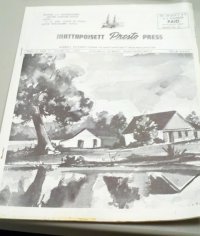A guest blog post by Christina Manzo, Digital Projects Intern.
 Over the course of this grant project, the Boston Public Library team has been lucky enough to visit some of the prettiest libraries that the state has to offer. From small, redbrick buildings to newly renovated structures, I would safely boast that Massachusetts has some of the prettiest libraries in the country. So when we pulled up to a storage facility in Mattapoisett, we were all a little unsure of what to expect. But if there’s anything I’ve learned from working at the BPL, it’s that you find the most interesting items in the oddest places. When we first entered the facility, we were taken to a private room where we could examine the collection proposed for digitization by the Mattapoisett Free Public Library. The boxes were pulled from a giant storage warehouse not unlike the one from Raiders of the Lost Ark.
Over the course of this grant project, the Boston Public Library team has been lucky enough to visit some of the prettiest libraries that the state has to offer. From small, redbrick buildings to newly renovated structures, I would safely boast that Massachusetts has some of the prettiest libraries in the country. So when we pulled up to a storage facility in Mattapoisett, we were all a little unsure of what to expect. But if there’s anything I’ve learned from working at the BPL, it’s that you find the most interesting items in the oddest places. When we first entered the facility, we were taken to a private room where we could examine the collection proposed for digitization by the Mattapoisett Free Public Library. The boxes were pulled from a giant storage warehouse not unlike the one from Raiders of the Lost Ark.
Contained within was the complete, half-century run of a local newspaper called The Presto Press, a magazine-format serial publication that included everything from want-ads to local historical and genealogical information.
The first thing that strikes you about The Presto Press is the cover art. The publisher, Donald Jason, was a talented artist and illustrated a good majority of the covers himself. The real prize at the bottom of these serial boxes, however, is the advertisements. Normally, readers tend to skim over advertisements in any publication. When the publication is historic, however, the ads become a window into the miniscule, almost negligible parts of history that often get overlooked.

For example, in The Presto Press, you could see ads for a number of items, services, and local businesses, including some that are still around today. The fact that you can discover the price of roast beef or milk ($0.75 per pound and $0.45 per gallon respectively) or how sewing machine companies tried to reach women of that era, is simply amazing. These are aspects of history that are largely ignored, but they play a role in how we understand our past.
It’s like having our own local version of Mad Men. By comparing an add for a sewing machine from 1955 to how the same product is portrayed today we can see how the country, its people, and the world has changed over time.
With or without the trademark fedora and whip, I think it’s undeniable that all librarians have a little bit of Indy in them. Even if they don’t escape from snake pits or hijack any German U-boats.



Add a comment to: Raiders of Lost History